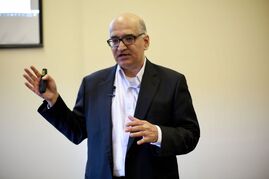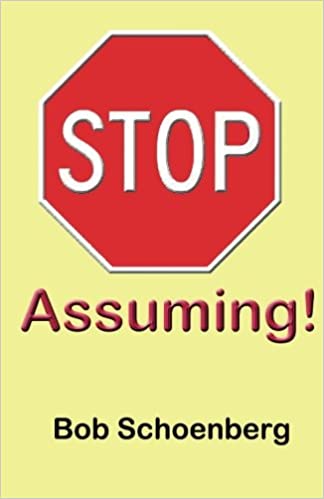|
We all make assumptions. Occasionally, Frequently, they can lead to confusion, embarrassment and get us into trouble. But If assumptions are made in certain professions, (such as business, engineering and medicine), that are bad, they can prove to be disastrous. Neville Chamberlain, prime minister of Great Britain, made one of the most catastrophic assumptions in history. Chamberlain assumed that by letting Adolph Hitler take over Sudetenland in Czechoslovakia, he would stop there. This assumption was made after Hitler had already annexed Rhineland and Austria. Though Great Britain and France had the military strength to stop Hitler, they assumed that Hitler would be satisfied. This assumption led to WWII. The book to turn to so you learn not to make assumptions is “Stop Assuming,” by Professor Bob Schoenberg. The book teaches you techniques you can use to avoid making assumptions. I recommend you read, study, and practice those techniques. It will help you not make assumptions and, instead, make better decisions. Schoenberg defines assumptions as “thoughts we have that we think are true, but we don’t know that they’re true.” He writes that there are two types of assumptions: general and personal. General assumptions do not involve you and can be proven true or false. Personal assumptions do involve you and are hard to prove because you may not be aware of it. The book main focus is on personal assumptions which tend to be “hidden” and are restrictive and/or negative in nature. If we can better understand how we can easily fall into this trap it would help us avoid making deleterious personal assumptions. to turn avoiding personal assumptions into a habit requires work and lots of practice. But as you will see in the book, anyone can do it and it will benefit you immensely in life and business. The book has many techniques you can learn to stop making assumptions. One of the simple techniques Bob writes about is Special Role Play. He writes how it works:
Below are five questions I posed to Bob about assumptions after reading the book. Question 1: I don’t believe I was ever taught this when I attended school. Is this skill taught in any school, or is this skill taught to those on an executive track to become effective leaders? The ability to identify and recognize assumptions is a critical thinking skill taught at the Critical and Creative Thinking Program at UMASS, Boston. However, they don’t focus on “personal assumptions.” I do that in my book, and in a non-credit course I teach. Question 2: Aren’t we making a lot of assumptions every day, so do you suggest keeping a log and review them at night to see how you did and what you need to do to refine your assumptions? Everyone makes assumptions, even I do. The important thing is to recognize that you are making an assumption and “challenge” it. Attempt to find out if it is true or false. Personal assumptions, although “hidden”, can easily be identified when you notice yourself using the phrase, “I can’t”. Question 3: We have a president who made an assumption---even with all the available resources---that COVID-19 Virus will simply go away. And as of this writing, we have over 165,000 COVID-19 related deaths. And he still has the job. So why should one learn what you teach when there are no consequences for making wrong assumptions repeatedly? Isn’t this a problem that the person holding the most important job in the world can get away with impunity for making terrible assumptions? There are indeed consequences, even for President Trump. We still live in a Democracy, and he could be voted out of office if people are dissatisfied with how he handled the COVID 19 virus. He will only get away with it if people vote for him, which indicates that they are satisfied with how he has been running the country. The majority of people are not satisfied with how he has handled the Virus. We will see what happens on Election Day. Question 4: Herman Cain recently died from contracting the COVID-19 Virus. He assumed that COVID-19 was not a threat and did not take adequate precautions such as social distancing and wearing a mask. He was a very successful businessman and gained a lot of attention when he ran for president in 2012. Aren’t we hardcoded in what we want to assume such that no supporting facts will change our beliefs? I don’t know enough about neuro-biology to answer the question about being hard-wired to our beliefs. Some people make up their minds and don’t want to be “confused” with the facts. People have different reasons for what they believe. Many people have taken a health crisis and turned it into a political issue. To change your belief, you have to be open to change. Beliefs are often very strong and entrenched. It takes a certain degree of open-mindedness and even courage, to even entertain the idea that maybe the belief you have isn’t valid. Question 5: Can this approach be used when you are giving a speech, sales call, and negotiation? Identifying and challenging assumptions, both general and personal, can be used in all of the above situations. This is a skill that takes practice, like all skills. However, there are more than assumptions at work here. You could definitely use this skill before you go to a sales call, but if the prospect doesn’t need your service or product, she won’t buy it. If you try and give a speech to a group of people who are opposed to your topic, you still might have a difficult time delivering the speech. Lastly, some of the best negotiators can’t resolve an issue if people are not willing to listen to the other side. There are many more skills involved in each of these activities. #####  Jay Oza is an author, speaker, executive coach. He makes people thrive on high stakes stage whether it's for a job interview, a sales presentation or a high-stakes speech. He is the author of a practical book Winning Speech Moments: How to Achieve Your Objective with Anyone, Anytime, Anywhere. You can get this book on Amazon for 99 cents for a limited time. Please download the free speech checklist that you can use to help you create a winning speech for any situation. Please contact him if you would like to have a two 75 minute coaching session on job interviewing or high-stakes speaking. If you are interested in inviting him to give a talk on job Interviewing or high-stakes speaking. You can reach him at [email protected].
0 Comments
Leave a Reply. |
AuthorJay Oza Archives
July 2024
Categories
All
|
© 2017 Winning Speech Moments


 RSS Feed
RSS Feed